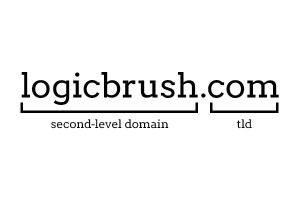What's the Difference Between Domain Name, Web Hosting and DNS?
When you're building a new website, the terminology can be confusing. You might be uncertain about what you need to purchase, from whom and for what reason. In particular, we find that our web design clients frequently have difficulty grasping the difference between a "domain name", "web hosting" and "DNS". Let's see if we can clear that up a bit...
Domain Name
A domain name is a human-friendly identifier, purchased from a registrar like GoDaddy or NameCheap that provides you the ability to publish and promote your services on the internet in a human-friendly manner. Our domain name, for example, is "logicbrush.com", and we purchased it from Amazon.

A domain name is broken up into two parts, separated by a period. The first part, called the "second-level domain" can be anything you like, as long as its composed of letters, numbers and a handful of special characters like hyphens [1]. The second part is the "top-level domain" (TLD), of which there are only a few — ".com", ".org", ".gov", etc. You must choose one when you register and not every TLD is available to everyone.
Depending on the TLD chosen, a domain name with cost you $20 or more to register. Generally you will need to renew your domain registration every year for a similar price.
When you purchase a domain name, it gives you the ability to offer services such as a website or email at that name, but it doesn't actually include those services. Buying a domain name just grants you the exclusive right to use the name for yourself.
Web Hosting
To actually run your website, you'll need a hosting plan in addition to a domain name. A hosting plan gives you access to a web server — a network accessible computer — that can respond to requests when someone types a URL into a browser or clicks on a link.
You might get your web hosting from the same place you get your domain name, or, it might be from somewhere else. Either way, it will be a separate, generally much greater fee. A hosting plan might cost you anything from $5/month for a basic plan, up to several hundreds of dollars a month for a large, e-commerce friendly server. Things get insane when you're talking about websites as large as Facebook or Wikipedia.
Web hosting comes in a bunch of different flavors that include shared hosting, VPS hosting and bare-metal hosting. Choosing one that's appropriate for your needs can be challenging. When you're just starting out, however, shared hosting is the cheapest and often sufficient.
DNS
DNS, or the "domain name system," is the internet service that connects your domain name to the services you offer. You can think of it as a gigantic look-up table, that links domain names and subdomains ("www.logicbrush.com") to the servers running the services you offer. For your website, you'll have a DNS "record" that points your domain to the IP address of your web server.
You'll need DNS hosting as well to define and edit your DNS records. Usually this will come along at no additional cost with your domain name, and your register will provide the tools you can use to manage your records.
Where to Learn More
Check out this great article from the Mozilla website that goes into more detail about the various components of the world wide web and how they work together. And feel free to hit us up with any questions in the comments below.
[1] In truth, a domain name can be more complicated that this, but this covers the most typical cases.
